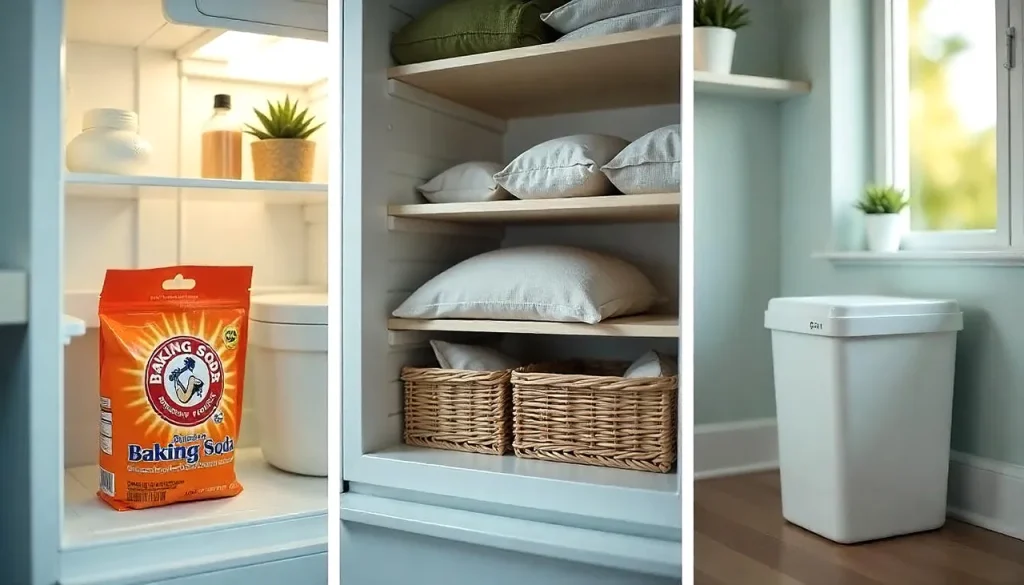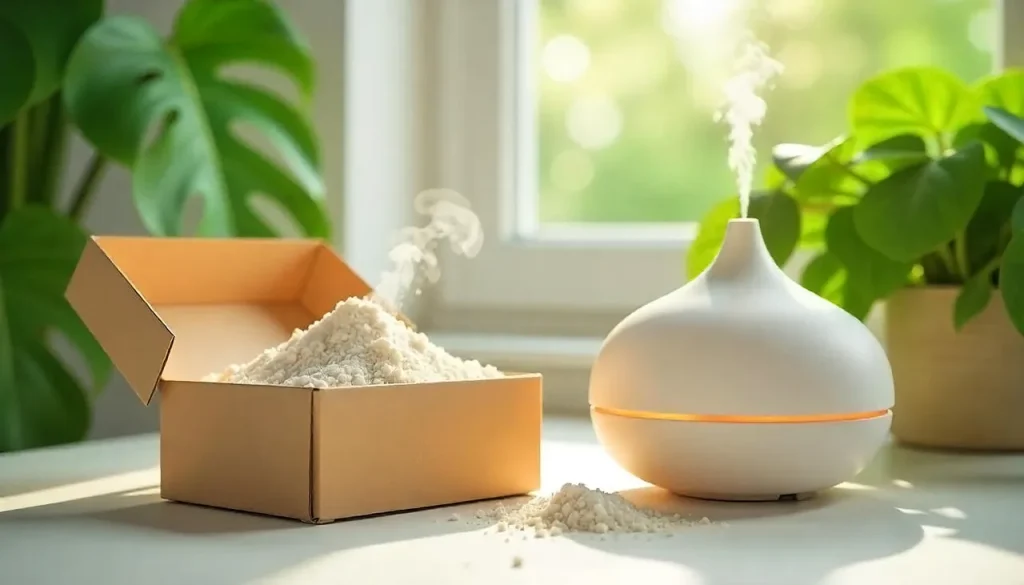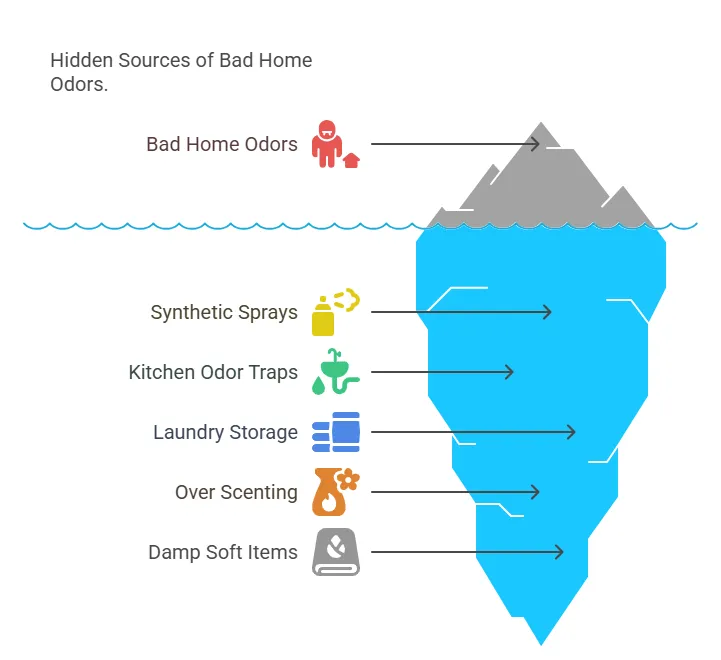How to keep house smelling fresh and clean? Open your windows daily, clean soft surfaces often, and use natural odor absorbers like baking soda or essential oils. These simple steps remove hidden smells and keep every room feeling fresh without using harsh chemicals.
Have you ever walked into your home and thought, “Why does it still smell off—even after I cleaned?” You’re not alone. It’s a common problem, and one that’s easy to miss when you’re used to your own space. Hidden odors can build up slowly in soft fabrics, trash bins, drains, and even the air itself. And while sprays might help for a while, they often just mask the real issue.
The good news? You can fix it—easily, naturally, and without expensive products. In this guide, I’ll walk you through 12 simple ways to keep your home smelling fresh all day, every day. These tips are fast, effective, and safe for families and pets. Let’s go step-by-step and explore exactly what works—plus a few tricks most people miss.
Find Hidden Odors: Your Quick Troubleshooter
Click on an area of your home below to discover common hidden odor sources and how to fix them!
Select an area above to see odor solutions!
Why Your Home Might Smell – Even When It’s Clean
Hidden odor sources in most homes
Even if your home looks spotless, there might still be smells hiding in plain sight. These odors often come from soft surfaces like carpets, curtains, and furniture. They soak up smells over time—especially from cooking, pets, and moisture.
Another common issue? Trash bins. Even after emptying them, lingering food residue can cause smells. The same goes for your garbage disposal and kitchen sink. You might also notice stale air coming from places like the bathroom, laundry area, or closets where there’s not much airflow.
Moisture is a big one, too. If you’ve ever noticed a damp, musty smell, it might be due to mold or mildew in hidden spots like under sinks, behind appliances, or around windows. According to the Centers for Disease Control and Prevention (CDC), indoor mold can grow on wood, drywall, or fabric—and it doesn’t take much water to start.
And don’t forget about pets. Their fur, beds, and toys can trap odors, even if you clean regularly.
Scent blindness: why you stop noticing your own home’s smell
Here’s something weird but true: your brain can “turn off” certain smells when you’re exposed to them all the time. It’s called olfactory adaptation, and it happens to everyone.
When you live in a space every day, your nose gets used to how it smells. That’s why guests might notice a strong smell you no longer recognize. People quickly adapt to common home odors—even ones linked to mold or bacteria. This is great for ignoring minor scents, but bad for detecting real odor problems.
One trick? Leave the house for a few hours, then walk in and take a deep breath. You’ll notice things more clearly with a “fresh nose.”
Real story:
Last year, I helped a friend figure out why her living room had a sour smell—even after she deep cleaned everything. Turns out, there was a slow water leak under her sink cabinet. The wood was soaked, and mold had started growing on the inside panel. It took months before she realized it. Once she replaced the cabinet and used a dehumidifier, the smell was gone.
Common Hidden Odor Sources and What to Check
| Area of the Home | Possible Odor Source | Fix or Prevention Tip |
|---|---|---|
| Kitchen | Trash bin, sink, dishwasher | Clean with vinegar weekly; air dry bins |
| Living Room | Sofa, rug, throw pillows | Vacuum weekly, steam clean monthly |
| Bathroom | Drains, damp towels, mildew | Wash towels often, pour baking soda in drains |
| Bedroom | Closets, laundry baskets | Use charcoal bags, don’t let clothes pile up |
| Pet Area | Pet beds, toys, litter boxes | Wash weekly, replace worn-out items |
| Laundry Room | Washer seals, trapped moisture | Wipe seals dry after use; leave door open |
How to Keep House Smelling Fresh and Clean: 12 Ways
Want your home to smell fresh every single day? These easy steps can make a big difference—without using any harsh chemicals. Just small changes to your daily routine can stop odors before they start. Let’s walk through what actually works.
1. Open your windows every morning (yes, even in winter)
Fresh air is your best friend. Even five to ten minutes a day helps move stale air out and brings fresh air in. This small habit removes cooking smells, trapped moisture, and pet odors fast.
In cold months, crack open windows during midday when it’s warmest. It helps prevent mold and lowers indoor pollutants, according to the EPA.
2. Use baking soda & charcoal in hidden spots
Some smells never go away on their own. But natural odor absorbers like baking soda and activated charcoal trap bad smells without masking them.

Here’s where to place them for best results:
| Area | Suggested Deodorizer |
|---|---|
| Fridge | Baking soda |
| Closet corners | Charcoal bags |
| Shoe racks | Coffee grounds |
| Under sinks | Charcoal bricks |
| Trash bins | Baking soda layer |
Change these every 30 days for best results. You can find odor-fighting charcoal bags online or in most home stores.
3. Try essential oil diffusers (with these 5 scents)
Essential oils do more than smell good. Some even kill bacteria in the air. Add 5–10 drops into a water-based diffuser and run it for an hour at a time.
Here are great scent choices:
- Lavender – calming and clean
- Lemon – fresh and energizing
- Eucalyptus – clears the air
- Peppermint – refreshing and crisp
- Tea tree – fights mold and mildew
Make sure the oils are 100% pure. Check labels for additives and only buy from trusted sources like National Association for Holistic Aromatherapy.
4. Clean your sofa, carpets & curtains often
These soft surfaces soak up smells like a sponge. Pet odors, smoke, and food scents can live in them for months.
Vacuum weekly. Use a steam cleaner or sprinkle a mix of baking soda and essential oil, let it sit for 30 minutes, then vacuum again. Don’t forget to wash removable covers and curtains every few weeks.
5. Keep your garbage area dry and ventilated
Trash smells are some of the worst—and they build up fast. Clean your trash bin once a week with hot water and vinegar. Let it dry fully before replacing the bag.
Keep the lid off for 10 minutes after cleaning to prevent trapped moisture. If you have a garbage disposal, toss in citrus peels and run cold water with baking soda once a week.
6. Bathe pets regularly and clean their beds
Your dog or cat might be clean, but their beds, blankets, and toys collect smells fast. Wash their things weekly using pet-safe detergent.
For fast odor control, spray a mix of equal parts water and vinegar on their beds and let it air dry. It kills bacteria and neutralizes smells.
7. Use a dehumidifier in damp rooms
Humidity leads to mildew—and mildew smells musty. Bathrooms, basements, and laundry rooms are common problem areas. Run a small dehumidifier to keep moisture levels under 60%.
The CDC recommends keeping humidity between 30% and 50% to prevent mold growth indoors.
8. Add air-purifying houseplants
Some plants do more than look nice—they help clean the air, too. According to NASA’s Clean Air Study, certain plants remove toxins and leave the air fresher.
Try these:
- Peace Lily
- Spider Plant
- Snake Plant
- English Ivy
Water them regularly, and don’t let soil stay soggy. Healthy plants = healthy air.
9. Simmer pots: scent your home the old-school way
This simple trick fills your kitchen and nearby rooms with amazing smells. Boil a pot of water and add:
- Orange or lemon peels
- Cinnamon sticks
- Fresh rosemary or cloves
Let it simmer on low heat for 30–60 minutes. Just keep an eye on the water level!
10. DIY vinegar + citrus spray for kitchen freshness
Mix 1 cup white vinegar with 1 cup water and 10 drops of lemon essential oil. Pour into a spray bottle. Use it on counters, trash lids, sinks, and even inside your fridge. It cuts grease, kills odor-causing bacteria, and leaves a fresh scent.
Vinegar smell fades in minutes—what’s left is clean air.
11. Create a bathroom scent station
Bathrooms are tough to keep fresh. Here’s a quick setup that works:
- Small diffuser with eucalyptus or lavender
- Toilet drop-ins or gel beads
- A bundle of eucalyptus hanging from your showerhead
Swap towels often, and open the window after showers to reduce humidity.
12. Do a “smell audit” every month
This simple habit makes a big difference. Leave your home for a few hours—go for a walk, visit a friend. When you return, take a deep breath at the door.
Ask yourself:
- Does it smell clean?
- Can I smell anything musty or stale?
- Which room seems off?
Make notes, then tackle that space first. A fresh-smelling home comes from small actions, done regularly.
DIY Natural Air Freshener Recipes That Actually Work

You don’t need store-bought sprays to keep your home smelling amazing. Many of them are packed with chemicals and fake fragrances. Instead, try these simple, natural recipes. They’re easy to make, safe for families and pets, and cost almost nothing.
Spray Mix: Fresh Every Time
This spray works on counters, carpets, trash bins, and even the air.
You’ll need:
- 1 cup distilled water
- 1 tablespoon baking soda
- 15 drops lavender essential oil (or lemon for a citrus scent)
How to use:
Shake well before each use. Spray lightly on fabric or into the air. Avoid using on wood or electronics.
Why it works: Baking soda neutralizes odor molecules. The essential oil leaves a clean, calming scent behind. According to Healthline, lavender oil also helps reduce stress while freshening the air.
Simmer Pot: Old-School Comfort
A simmer pot is perfect for freshening up the kitchen, living room, or entryway. It’s like cooking up a clean-smelling vibe.
Try this mix:
- Citrus peels (orange, lemon, or both)
- 2 cinnamon sticks
- A few sprigs of rosemary or mint
- 1 teaspoon whole cloves
How to use:
Fill a pot with water. Add your ingredients. Simmer on low. Refill water as needed. Your home will smell warm and inviting in minutes.
This method is chemical-free, completely customizable, and ideal during colder months when you want a cozy feel indoors.
Carpet Deodorizer: Clean Floor, Clean Air
Carpets hold onto smells from feet, food, and pets. This powder freshens things up fast.
Ingredients:
- 1 cup baking soda
- 10 drops eucalyptus or lemon essential oil
Instructions:
Mix well and store in a dry container. Sprinkle over your carpet. Let it sit for 15–30 minutes. Then vacuum thoroughly.
Tip: Use this once a week or after hosting guests. According to a study from the NIH, baking soda is effective at reducing airborne odors in enclosed spaces.
Bonus Tip: Gel Jar Air Freshener
If you want a slow-release scent, make a gel jar.
What you’ll need:
- ¾ cup water
- 1 tablespoon unflavored gelatin
- 15 drops of essential oil
- 1 tablespoon salt
- Small jar with a lid (poke holes in it)
Steps:
Boil half the water. Stir in gelatin and salt. Add the rest of the water and essential oil. Pour into the jar and let it set. Place one in the bathroom or near shoes.
It lasts 2–3 weeks and is a fun weekend project.
Expert Insight:
“Natural fresheners don’t just mask odors—they neutralize them at the source. And they’re safer for kids, pets, and your air quality.”
— Dr. Amanda Lee, Environmental Chemist, University of Oregon
Mistakes That Make Your Home Smell Worse

Trying to make your home smell better can sometimes have the opposite effect. Many popular fixes only cover up odors—or even make them worse. If your house still smells “off” after cleaning, one of these habits might be the problem.
Overusing synthetic sprays and candles
Spraying air fresheners might feel like a quick win. But they often just mask bad smells instead of removing them. Many commercial sprays contain VOCs (volatile organic compounds), which can build up in the air and irritate your lungs.
According to the Environmental Protection Agency (EPA), some synthetic fragrances release harmful chemicals like formaldehyde and benzene.
And those strong candles? If you’re not ventilating the space, you’re trapping the smoke and fragrance oil particles indoors—leading to even more stuffy air.
Better option: Use natural essential oil diffusers, or open windows while using scented products.
Ignoring garbage disposals and dishwashers
Kitchens are a major source of hidden smells. Even if you clean your counters and take out the trash, your garbage disposal and dishwasher can be sneaky odor traps.
Food bits get stuck in crevices, build bacteria, and create a sour or rotten smell that spreads fast. If left unchecked, it can smell like your home isn’t clean—even if it is.
Quick fix:
- Garbage disposal: Pour ½ cup baking soda, then ½ cup vinegar. Let sit 10 minutes. Rinse with hot water.
- Dishwasher: Run an empty cycle with a bowl of white vinegar on the top rack.
Storing laundry baskets in warm, closed spaces
Dirty clothes that sit too long in baskets—especially in humid or closed-off rooms—can create musty, sour smells. Even clean clothes can pick up that scent if the basket is plastic and never cleaned.
Tip:
- Use breathable laundry hampers (mesh or cotton-lined).
- Keep baskets in dry, airy places—not behind doors or near bathrooms.
- Wipe down the inside of plastic hampers monthly.
Using “too much scent” in small spaces
More isn’t always better. Overloading a room with multiple scent sources—candles, sprays, plug-ins—can create a heavy, artificial smell that mixes with natural odors and makes things worse.
In small rooms like bathrooms or bedrooms, strong smells can cause headaches and leave an overwhelming scent cloud. And if there’s already moisture or mold, it just traps the odor under layers of perfume.
Better habit: Choose one freshener per space and focus on removing odors first, then lightly adding scent.
Not letting soft items fully dry
Wet towels, damp bathmats, or washed clothes that don’t dry all the way can turn into mildew magnets. The smell is often described as “sour” or “swampy”—and it spreads fast.
Even your sponge or cleaning cloth can be the source. If it never dries out between uses, it’s going to stink.
Solution:
- Hang items where air can flow freely.
- Use hooks instead of over-the-door racks.
- Switch to microfiber cloths that dry quicker.
- Wash bath mats weekly and dry them in sunlight when possible.
Pro Tip:
If you’ve cleaned everything and your home still smells odd, try this: turn off all scents for 24 hours. No candles, sprays, or diffusers. Then do a slow walk through each room. You’ll better notice the real source of the smell.
Final Thoughts: A Fresh-Smelling Home Is a Clean Home
A fresh-smelling home doesn’t require fancy tools or chemical sprays. It’s about simple habits—ventilation, odor control, and cleaning the right spots at the right time. With the tips in this guide, you can turn any space into a place that feels light, clean, and welcoming.
You don’t need to do it all at once. Start with two easy changes—open a window daily and clean your soft furniture. From there, build a routine that works for your lifestyle.
Want help staying on track? Download our free “Fresh Home Checklist” or sign up for weekly tips from HomeHygia. Small steps = big results.
Quick Reference Table: What to Use & Where
| Problem Area | Natural Fix | How Often to Use |
|---|---|---|
| Trash bins | Baking soda + vinegar | Weekly clean |
| Sofas & curtains | Steam clean or spray | Every 2–4 weeks |
| Closets | Charcoal bags | Replace monthly |
| Bathrooms | Eucalyptus + ventilation | Daily quick refresh |
| Kitchens | Citrus spray or simmer pot | 2–3 times per week |
| Pets & fabrics | Wash + vinegar rinse | Weekly wash cycle |
FAQs
What absorbs odors best in a house?
Baking soda is one of the best natural odor absorbers. It works by neutralizing acidic and basic odor molecules. Activated charcoal is also great—it traps odors in its pores and works well in hidden spaces. You can also use vinegar, coffee grounds, or zeolite minerals. The National Institutes of Health (NIH) notes that charcoal is especially effective in controlling indoor air pollution.
How do I make my home smell good naturally?
Let fresh air in, clean fabrics often, and use a simple essential oil diffuser. Simmer pots, citrus peels, and baking soda deodorizer sprays are also easy to make. Keep moisture low and avoid synthetic sprays that just cover up smells.
Why does my clean house still smell?
Hidden sources like drains, soft furniture, or wet towels may still hold smells. Scent blindness also plays a role—you stop noticing odors you’re used to. Try a “fresh nose test” after being away for a few hours to catch what you’re missing.
Which essential oils last the longest?
Patchouli, cedarwood, frankincense, and sandalwood are long-lasting. These oils are thick and evaporate slower. Combine them with lighter scents like lemon or lavender for a balanced, lasting aroma. Store oils in dark bottles away from sunlight to preserve scent strength.
How can I keep my house guest-ready all the time?
Focus on a few daily habits:
* Open windows each morning
* Wipe down high-traffic areas
* Use a room spray or simmer pot before guests arrive
* Keep entryway shoes and laundry tucked away
* These small steps make a big impact fast.
